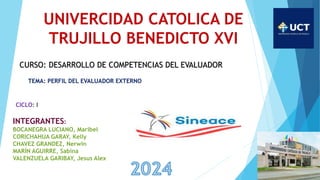TRABAJO GRUPAL DL CURSO DE DESARROLLO PERSONAL
•Download as PPTX, PDF•
0 likes•1 view
TRABAJO
Report
Share
Report
Share

Recommended
Recommended
More Related Content
Featured
Featured (20)
Product Design Trends in 2024 | Teenage Engineerings

Product Design Trends in 2024 | Teenage Engineerings
How Race, Age and Gender Shape Attitudes Towards Mental Health

How Race, Age and Gender Shape Attitudes Towards Mental Health
AI Trends in Creative Operations 2024 by Artwork Flow.pdf

AI Trends in Creative Operations 2024 by Artwork Flow.pdf
Content Methodology: A Best Practices Report (Webinar)

Content Methodology: A Best Practices Report (Webinar)
How to Prepare For a Successful Job Search for 2024

How to Prepare For a Successful Job Search for 2024
Social Media Marketing Trends 2024 // The Global Indie Insights

Social Media Marketing Trends 2024 // The Global Indie Insights
Trends In Paid Search: Navigating The Digital Landscape In 2024

Trends In Paid Search: Navigating The Digital Landscape In 2024
5 Public speaking tips from TED - Visualized summary

5 Public speaking tips from TED - Visualized summary
Google's Just Not That Into You: Understanding Core Updates & Search Intent

Google's Just Not That Into You: Understanding Core Updates & Search Intent
The six step guide to practical project management

The six step guide to practical project management
Beginners Guide to TikTok for Search - Rachel Pearson - We are Tilt __ Bright...

Beginners Guide to TikTok for Search - Rachel Pearson - We are Tilt __ Bright...
TRABAJO GRUPAL DL CURSO DE DESARROLLO PERSONAL
- 1. CURSO: DESARROLLO DE COMPETENCIAS DEL EVALUADOR INTEGRANTES: BOCANEGRA LUCIANO, Maribel CORICHAHUA GARAY, Kelly CHAVEZ GRANDEZ, Nerwin MARÍN AGUIRRE, Sabina VALENZUELA GARIBAY, Jesus Alex TEMA: PERFIL DEL EVALUADOR EXTERNO CICLO: I
- 2. CASO 4: Imagina que un evaluador externo es contratado por una agencia gubernamental para evaluar la calidad de las escuelas en una región determinada. Durante el proceso de evaluación, el evaluador recibe presión externa de funcionarios políticos o grupos de interés para influir en los resultados y favorecer a ciertas escuelas o distritos. CONFLICTO ETICO Y PROFESIONAL: Surge porque el evaluador se enfrenta con la difícil situación de actuar con honestidad y transparencia, en todas las etapas del proceso de evaluación, faltando al principio de imparcialidad, confidencialidad y objetividad.
- 3. REVELAR EL CONFLICTO: El evaluador debe informar a las partes su relación personal con la agencia gubernamental, para poder tomar medidas y garantizar la imparcialidad del proceso. RECONOCER EL CONFLICTO: El evaluador debe ser consciente de su relación con la agencia gubernamental que puede influir en su juicio y en objetividad de su evaluación. Para resolver este conflicto ético, el evaluador debe: TOMAR MEDIDAS PARA MITIGAR EL CONFLICTO: El evaluador debe tomar medidas para mitigar el conflicto, como podría ser limitar su participación en las escuelas o distritos que tengan influencia de la agencia gubernamental. Para la evaluación no pueda verse afectada por dicha relación. PRIORIZAR LA INTEGRIDAD PROFESIONAL: El evaluador debe ser consciente de su responsabilidad principal, el de realizar una evaluación justa e imparcial, independientemente de su relación con la agencia gubernamental. Debe abordar este conflicto de manera transparente y tomar medidas para garantizar la imparcialidad y objetividad del proceso de evaluación.
- 4. PERFIL DE UN EVALUADOR EXTERNO Ser competente e idóneo profesionalme nte Formación académica pertinente Familiarización con el proceso de acreditación, sus estándares, componentes y criterios de evaluación. Conocimiento del contexto cultural y organizacional del prestador institucional al que acreditan. Características intrínsecas: valores éticos y morales. Amplia experiencia laboral